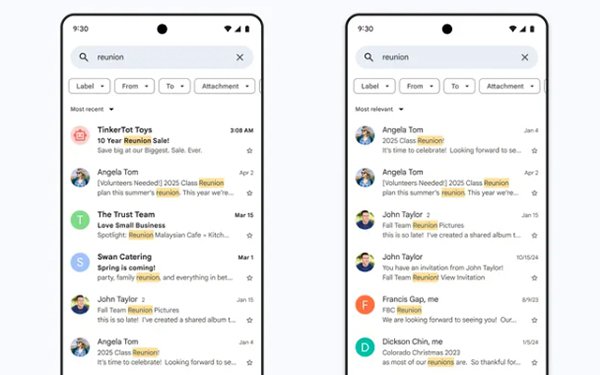
Artificial intelligence (AI) continues to raise privacy
implications as companies like Google and Microsoft integrate the technology into a variety of their respective platforms.
This time the focus turns to Google's latest updates to Gmail.
With estimates putting the number of Gmail users at more than 1.8 billion worldwide, can you imagine one company having that much consumer preference data?
Users can now prioritize relevance
before arrival time or chronological order. How does the technology know what’s relevant without reading the content? It can’t. AI can help pull out information within articles and
emails.
Rather than serve the emails in chronological order based on keywords, Gmail search results now factors in elements like recency, most-clicked emails and frequent contacts.
Once available in an account, the user will have an option to toggle between “most relevant” and “most recent” results. This will become available to business users in the
future.
advertisement
advertisement
A breakdown of Google’s Gmail retention practices offers some insights into privacy. The company said it may retain certain data, including Gmail data, for longer periods if
necessary for legitimate business or legal reasons.
These reasons can include security, fraud and abuse prevention, financial record-keeping, and compliance with legal and regulatory
requirements.
There has been speculation that Google “may store information for up to 18 months by default – in some cases, even up to 3 years. Even when users opt out, a brief
retention period of up to 72 hours still applies,” but there are no statement in Google’s privacy policy that suggest this to be true.
StartMail in a blog post from November 2024
explains that AI-powered email systems like Google’s Gmail and Microsoft Outlook have the ability to scan the content of emails, extracting valuable information for a variety of
purposes.
The data ranges from analyzing keywords for targeted advertising to studying patterns that predict user behavior. The more AI learns about us through our emails, the more accurately
it can profile us. And that has the potential to invade consumer privacy, according to StartMail.
The search history in AI agents, AI Mode, Google Search and other Google platforms are
extremely personal as the AI gets to know you better.
Google Search results have had the ability for years to sort by time. Relevance became the cornerstone of Google’s search
ranking algorithm with PageRank, which analyzes the links between web pages to determine the importance of a website to the query.
Google’s Gmail began summarizing emails for users in their account in June 2024.
At the time the technology
summarized an email thread, suggested responses to an email thread, and managed to draft an email and ask questions to find specific information from emails within the user’s inbox or Google
Drive files
Despite all this, Google insists that it respects user privacy and offers control of these features.
Google had previously scanned Gmail message content to
personalize ads in the platform, but stopped this process in 2017. It does use AI to filter spam and malware, sort email into categories, and now the company prioritizes the emails for relevance.